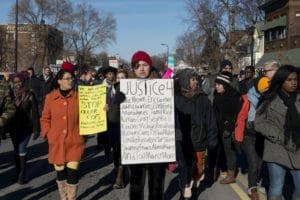by Jacqueline Bediako
As a Black woman, I am oppressed by a white supremacist society.
Just like the other Black men and women – Matthew Ajibade, Rekia Boyd, Darrien Hunt, Sandra Bland and Joyce Curnell – before they were killed by police, I am running on borrowed time.

The recent deaths of Alton Sterling, 37, and Philando Castile, 32, at the hands of state-sanctioned violence are additional tragedies in an endless list of Black victims, and a reminder that premature Black death continues to take center stage in the Black narrative.
With our heads in our hands and our eyes swollen, we keep asking, when will Black lives matter?
White silence about these atrocities is almost as dangerous as the hand that pulls the trigger.
Speaking in Beijing in 1966, Robert F. Williams, author and civil rights leader, emphasized this point: “A good man who is silent and inactive in times of great injustice and oppression is no good man at all. He is no ally to freedom and justice but is a silent partner to tyranny and condemnation. He does not deserve exemption from the condemnation and the vengeance of those whom his silence allows to be victimized.”
It is not enough for white people to shake their heads and reject the violence endured by others while protected by the safety net of their exclusive white world. This quiet empathy needs to translate into action where legislative changes are demanded and current systems of oppression are abolished.
White silence about these atrocities is almost as dangerous as the hand that pulls the trigger.
White people have benefited from the fruits of Black labor and Black creativity for a long time. Wealth has been passed along white bloodlines enabling future generations to access property, education, freedom of movement, political discourse and access to healthcare.
Gentrification enables white opportunists to benefit from cheaper rents to the detriment of residents of color. Black culture has increased profits for white-owned companies and paid for holiday homes, lavish lifestyles, college degrees and retirement. All the while, violence has had free reign in the Black community, which means that doing something as simple as driving while Black can be a certain route to death.
Robert F. Williams, author and civil rights leader, emphasized this point: “A good man who is silent and inactive in times of great injustice and oppression is no good man at all. He is no ally to freedom and justice but is a silent partner to tyranny and condemnation. He does not deserve exemption from the condemnation and the vengeance of those whom his silence allows to be victimized.”
If Black people aren’t getting murdered on their way home from work, they are being incarcerated on a mass scale and locked out by being locked in. They are living in deprived communities in which food apartheid is the norm, and Black health is disregarded – just look at what happened in Flint, Michigan.
Black people are exposed to bad schools with teachers who don’t want to be there. Indeed, the violence and racism – two sides of the same coin – assume many different forms, and some forms are more recognizable than others.
Publicly condemning these injustices and advocating for the complete eradication of structural racism is the least that white people can do.
Black activists are working around the clock to bring about real changes, but they need the people – white people included – to stand behind them. It doesn’t matter if you’re married to a Black person or have a Brown person working in your office; white guilt and white history cannot be managed or rewritten by minute acts of social tolerance.
Publicly condemning these injustices and advocating for the complete eradication of structural racism is the least that white people can do.
White supremacy is global in its scope. From the oppression of Ethiopian Jews in Israel to the state-sanctioned violence endured by Black children at a Texas pool party, many are still enslaved by systemic racism that devalues, dehumanizes and shamefully ridicules the Black community.
Further, if the current system is killing us, of course we will call for abolition of the current system. But our demands for abolition do not mean we condone random acts of violence or revenge. If anything, we have an unbelievable level of self-control and restraint given the longevity of the oppression we have endured.
After moving to America from the U.K. back in 2007, I was warned by a white revolutionary to never call the police because “I will end up in a worse state than before.”
It is devastating to know that the very people assigned to protect me are the ones who would kill me.
And so living in America is about survival, and survival has been the modus operandi for African Americans for far too long.
White revolutionaries need to rise up alongside Black revolutionaries so that their fellow citizens are not simply surviving, but living.
White revolutionaries need to rise up alongside Black revolutionaries so that their fellow citizens are not simply surviving, but living.
Jacqueline Bediako is a Ghanaian writer, teacher and activist who was born in London, England. After completing her undergraduate studies in England, Jacqueline moved to America. She currently lives in Brooklyn, New York, and has called New York City home for the past eight years. Her work focuses on race, politics and the education of students with disabilities. Follow her @jb2721.





